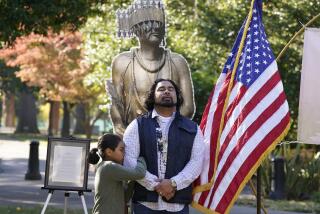JAZZ REVIEW : A Reduced Tribe Still Strong on Interplay at LunaPark
- Share via
Lost Tribe’s recent “Soulfish” recording is a rhythmically expansive affair featuring a varied supply of jazz and hip-hop riffs powered by dual guitars, wiry alto sax and strong drumming.
But the New York-based ensemble came up one short Monday at LunaPark. Minus guitarist David Gilmore, who remained in New York due to prior engagements, the Tribe lost one of its main attractions: the counterpointed attacks of Gilmore and guitarist Adam Rogers.
In performance, this loss of density worked in the Tribe’s favor, opening up its sound to more direct interplay among its remaining four members, while emphasizing the improvisational nature of its music.
Fans of Brooklyn’s M-Base movement, the tough-minded, street-beat jazz genre that includes saxophonists Steve Coleman and Greg Osby, will embrace the Tribes’ accessible, often quirky beats and the inspired, angular play of alto saxophonist David Binney. But the Tribe works without the intellectual distance that cools much of the M-Base sound. Instead, its material seems designed to attract pop audiences albeit while working with definitive jazz sensibilities. At the core of this attack is drummer Ben Perowsky, whose muscle and extended sense of percussive color--he substitutes a hubcap for one of his cymbals--kept simple thematic material such as “It’s Not What It Is” from feeling repetitious.
But the Tribe’s best material is more atmospheric. Binney’s “Room of Life” allowed the saxophonist to build from spare quiet phrases, to soul-baring, primal screams.
More to Read
The biggest entertainment stories
Get our big stories about Hollywood, film, television, music, arts, culture and more right in your inbox as soon as they publish.
You may occasionally receive promotional content from the Los Angeles Times.










